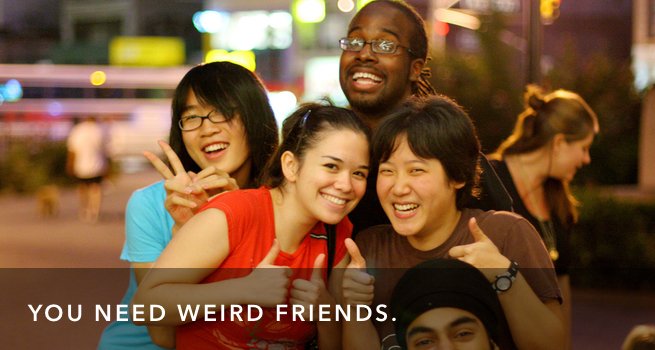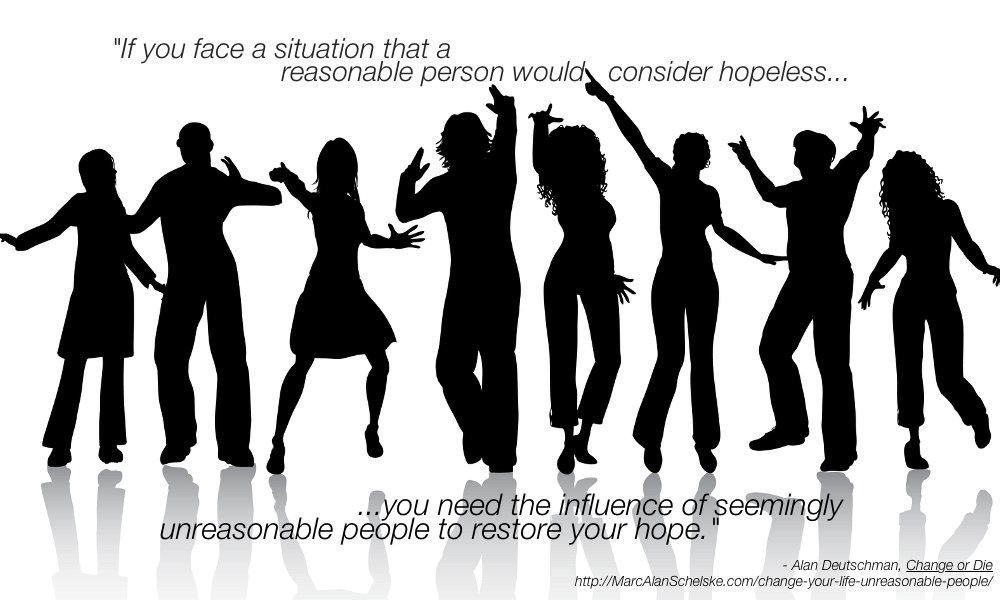The odds are stacked against you. It’s 9-to-1 that you won’t change. That’s not a made-up internet statistic (85% of statistics quoted on the internet are made up on the spot. Really.) That statistic comes from research on patients diagnosed with heart disease, cited in the book Change or Die by Alan Deutschman.
These patients were told the truth of their situation. They were given clear, do-able steps they could take to increase the length of their lives. For them to not change was to choose an early death. And yet, 9 out of 10 never made the change. Deutschman’s book goes on to look at the 10%, the ones who did make the change. How did they do it? What set them apart?
In the last post, “Change Your Life? Then Find These 3 Things” I summarized the three necessary elements that lead to real and lasting life change.
Today, we’re going to dig into the first of these. Deutschman labelled it “Relate.”
You Need More Than You

Have a dream. Imagine a better life. Ache for the change so badly you can’t stand it. But without this first element, most of us can’t make the change last. Our American cultural theology teaches us to idolize the self-made person. The cowboy. The entrepreneur. We’re told that the power to change is within us. If we can just believe in ourselves, if we can know that we are powerful, if we can choose to be the change, then the change will happen.
But the statistics, and my own experience as a pastor working with people who want to change their lives for nearly 20 years, suggest this just isn’t enough.
Change is rooted in hope and vision. Vision notoriously leaks. If we’re not reminded of it on a regular basis, we get fuzzy around the edges. The normal routine of everyday life crowds in. The goals we committed to end up on the back-burner. If you’ve ever failed to keep a New Year’s Resolution, you know this is true.
Relationships Are The Foundation of Change
This is where the relationships come in. Deutschman named this step of change “Relate,” and here is how he defines it: “You form a new, emotional relationship with a person or community that inspires and sustains hope.”[note]Deutschman, Alan (2009-10-13). Change or Die (p. 14). Harper Collins, Inc. Kindle Edition.[/note]
Let’s take that apart.
1. “You form a new relationship.”
This is a new relationship. Why? If you’re struggling to change and your current relationships aren’t helping you change already, then you need new relationships.
Sometimes it can be a new kind of relationship with someone you already are connected to. I’ve invited a long-time acquaintance to begin meeting with me with the specific intention of encouraging each other’s growth. This was an old relationship, but with that new permission it became a new kind of relationship. Most of the time, though, this needs to be a new relationship.
2. “You form an emotional relationship.”
This relationship has an emotional connection. Why? Because motivation is essentially emotional. That’s what the word means. The word “emotion” comes from the Latin root emovere meaning “to move, or move out.” Our emotions are the motivational center of who we are.
Without an emotional connection, we’re left with rationalization and justification. We can come up with reasons for anything. That’s what an excuse is, after all. If you’ve got more excuses than life change, there’s a reason. There is some kind of emotional payoff for being where you are, no matter what you say about it.
In order to break this deadlock, you need emotional motivation in a new direction. You need an emotional draw, a pay-off that comes around the idea of change and the new way of being. This comes quite naturally when you build relationships with people who are where you want to be.
3. “…with a person or community…”
This relationship could be with a single person, like a mentor. It could (and more often is) with a community of people who have a shared vision of change and growth. This is what exists with a good AA group or other support group. It’s what you find in healthy churches and small groups. It’s what you experience in a Master’s Class group where people are committed to growing in a certain area.
4. “…that sustains hope.”
This person or community helps you change by providing several necessary things.
First, they provide a vision.
You can’t change if you can’t imagine change. Some of us have been the way we are for so long that it’s really hard to imagine life any different. But when you come across someone who was where you are now and who has already made the change, a glimmer of hope opens up. You can see in them a picture of who you want to be. This can happen in a passing interaction, but when you start spending time with this person or group, you are constantly reminded of the vision.
Second, they provide experience.
These aren’t people speaking out of opinions and theories. These are people who have walked the path before you. They know what they are talking about. An AA sponsor is effective precisely because she has walked that path before. She knows what it’s like to be hungry, angry, lonely or tired and to fall off the wagon because of it.
Third, they provide direction.
Having walked the path before, they are uniquely equipped to give you credible input on what steps you need to take next.
You Need Unreasonable People.
Deutschman calls these people the unreasonable people. In the same passage he writes:
“If you face a situation that a reasonable person would consider ‘hopeless,’ you need the influence of seemingly ‘unreasonable’ people to restore your hope—to make you believe that you can change and expect that you will change.”
If you are ready to make a change, these are the kind of people you need in your life. They will inspire you. They will guide you. They will help you keep moving forward.
In the next post, we’ll talk about the do-able steps that they help you with. But today, you must consider this: If you’re ready to change, you need some unreasonable people in your life.
Who are your unreasonable people?

